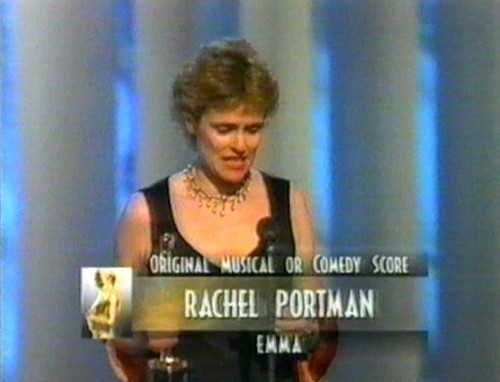by Travis Cragg
Hildur Guðnadóttir already has an Emmy and a Globe. Is an Oscar next?Watching Icelandic composer Hildur Guðnadóttir walking up to receive her Golden Globe for Joker was one of the more interesting moments of last weekend's ceremony. My streaming service in Australia suddenly decided to log me out just as the presenter came on stage, so I was cursing the world and rebooting! Once the anxiety was over, and Hildur was walking up to accept her trophy, it was time to reflect on a woman winning the equivalent Oscar. The Globe win for Score doesn't always transfer to an Oscar win (sometimes the winner isn't even nominated -- as with All is Lost and First Man in recent years) but could Guðnadóttir repeat?
Has a woman ever won the Oscar for Best Original Score before? Turns out it has happened, but only with double-category caveats…
The most recent examples were in the years of 1995-9, when the category was split into two prizes: “Dramatic”, and “Musical or Comedy”. This split was a response to Disney animated musicals winning most of the composing awards in the early 1990s, but the split was so unpopular that it reverted back to one category in 2000.
[A related sidenote: Did you know that, according to Academy Rule Fifteen, the category of “Original Musical” exists? It was also created in 2000 as an appeasement for re-merging the two Score categories into one. An Original Musical “…consists of not fewer than five original songs … by the same writer or team of writers, either used as voiceovers or visually performed. Each of these songs must be substantively rendered, clearly audible, and intelligible, and must further the storyline of the motion picture. An arbitrary group of songs unessential to the storyline will not be considered eligible.” Given that the rules for all categories is that you must have at least ten eligible films, it’s not hard to understand why this category has never been instigated.]
The first female Oscar score winner (travelling backwards in time) is Anne Dudley, who won with her only nomination to date for 1997’s The Full Monty (in the Musical or Comedy category). Dudley works fairly consistently in the UK, with The Crying Game, Elle and television’s “Poldark” on her resumé. Her most recent work is last year’s The Hustle. She was also a member of the pop band Art Of Noise, who you might remember for hits such as their interpretation of the Peter Gunn theme and the collaboration with Tom Jones in covering Prince’s “Kiss”.
 Rachel Portman has 3 nominations and 1 win
Rachel Portman has 3 nominations and 1 win
Next is the only name that came to mind before I started researching: Rachel Portman. She was nominated for The Cider House Rules (1999) and Chocolat (2000), and she won in the Musical or Comedy category for 1996’s Emma. Her most recent feature-length composing was for 2017’s A Dog’s Purpose.
You have to travel all the way back to 1983 for the only other female winner of the category: Marilyn Bergman for Yentl. This was at the tail end of the other, much longer, period where the scoring category was split into two (1939-85, with the one-off unusual exception of 1958 where they all competed together) . The category names changed a few times but, in 1983, the categories were “Original Score”, and “Original Song Score and Its Adaptation or Adaptation Score”. Bergman won for the latter, along with her husband Alan (they were the lyricists) and Michel Legrand. Marilyn was also a multiple winner in the Song category, for The Thomas Crown Affair, The Way We Were and Yentl.
 The Bergmans at the 1983 Oscars with Neil Diamond and Michel Legrand
The Bergmans at the 1983 Oscars with Neil Diamond and Michel Legrand
Other female nominees in the various Score categories over the years: Angela Morley (1974’s The Little Prince and 1976’s The Slipper And The Rose: The Story Of Cinderella), Lynn Ahrens (for 1997’s Anastasia) and Mica Levi (for 2016’s Jackie).
Do you think Gudnadottir has a good chance to join the winners and/or nominees club?